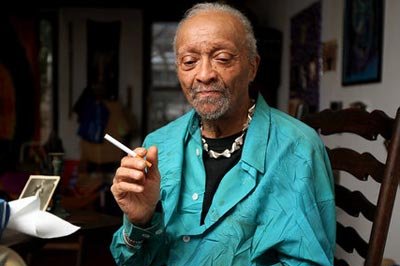On March 8, a quintet of world-class jazz musicians will mark the 85th birthday of pianist and composer Cecil Taylor by playing a concert in his honor at the Painted Bride Art Center, 230 Vine St.
The performance, dubbed “Celebrating Cecil,” is also the first event in a mini-festival called “Still the New Thing,” a three-concert series showcasing the challenging music that Taylor and his fellow visionaries, Ornette Coleman and Sun Ra, first introduced to audiences in the late 1950s.
Local saxophonist Bobby Zankel is curating the festival, which he organized with the help of the Ars Nova Workshop, the Philadelphia Jazz Project and his group, Warriors of the Wonderful Sound.
Taylor may not be a household name, but his accomplishments are formidable. After studying at the New England Conservatory, he began performing music referencing Ellington and Stravinsky. Early on, club owners were wary of booking him, but he eventually played for President Carter on the White House lawn. And although many critics initially dismissed his work, Taylor eventually received both a Guggenheim Fellowship and a MacArthur “Genius” Award.
That he did all of this as an openly gay African-American man only makes it all the more remarkable.
All of this is no surprise to Zankel, who describes Taylor as “probably one of the greatest musicians of the 20th, and now the 21st, centuries.”
Zankel was a 20-year-old music student at the University of Wisconsin when Taylor arrived on campus as an artist-in-residence. It was a life-changing encounter, he said.
For the next few years, he studied with Taylor, played his music and absorbed his overall philosophy.
“In a very old-fashioned, ancient way, he was really a mentor, more than just someone who taught me how to play notes or how to write notes or a bandleader who I worked for,” Zankel said.
That relationship continues to this day. According to Zankel, Taylor isn’t just a musician; he’s a thinker, someone for whom ideas are important. He notes that audiences that see Taylor perform are just as likely to hear him recite his poetry or to see him dance as they are to hear a virtuosic solo recital. He has a serious interest in architecture and is also a passionate fan of female vocalists like Lena Horne.
Still, Taylor is known for his music, and his major contribution may just be how he opened things up for improvisers.
“He came up with the concept of playing jazz, playing black, African-American, traditional music, in a way where there’s no meter,” Zankel said. “It’s not an odd-meter, it’s not a mixed-meter, it’s non-metrical. So the drums and the different instruments could improvise or play the written material — because he has a lot of written material — they could play without a ‘one,’ so to speak.”
Taylor’s recorded output is vast and encompasses everything from solo recitals to big bands, and from studio experiments to live concerts. There is even an 11-CD boxed set on the German label FMP documenting his performances with European luminaries.
For listeners curious to hear Taylor, Zankel recommends some of his early recordings.
“The most accessible, just because of the label that they’re on and the way you can get them in the stores, are the two records that he made for the Blue Note label in the mid-’60s called ‘Unit Structures’ and ‘Conquistador.’”
The concert itself should also provide a good introduction to Taylor’s music, thanks to the musicians Zankel has assembled. Each player has long been associated with the piano virtuoso. Andrew Cyrille drummed with him for a decade, and Henry Grimes played bass on his key early recordings. Bassist William Parker was with Taylor when he connected with major figures in the European free-improvisation scene.
Pianist Dave Burrell may have the most daunting task of all, but Zankel views him as an ideal musician to help summon the spirit of Taylor’s music.
“Dave has been playing with the greatest musicians in the world at the highest level for five decades, and his personality, his self-awareness informs him,” Zankel said. “He’s totally prepared to do what he has to and do it magnificently.”
Together, the five men should make a joyful noise, by turns cerebral, earthy, challenging and playful.
Zankel also hopes to impart to the audience the crucial lesson he learned from Taylor, what he calls the endless possibilities of living.
“That’s the thing that I got from Cecil,” he said. “That I felt like I could do anything, that I had unlimited potential to express myself, that I had unlimited ability to feel empathy with other people, that I had unlimited ability to find joy in living, even in as hard times as we live in. And I would like to be able to share that feeling of limitless possibility.”
For more information, visit www.paintedbride.org.

